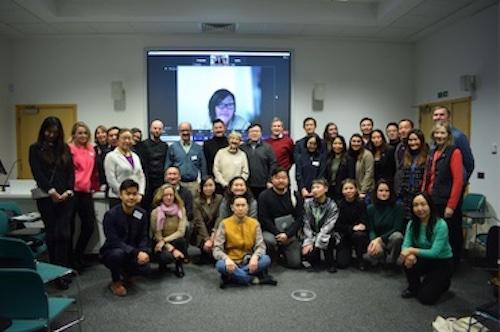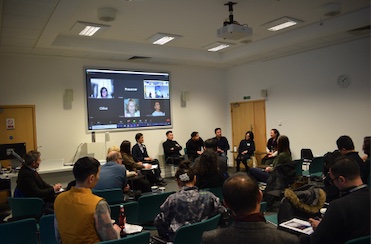
Economy and Environment in Post-Mining Mongolia and the Future of Mongolian Studies
After a lengthy Covid-19 hiatus, the Mongolia and Inner Asia Studies Unit (MIASU, Cambridge) resumed its public engagement activities by launching the inaugural Cambridge Mongolia Forum (CMF) on 15-16 December 2022. Convened by Professor Uradyn E. Bulag and co-sponsored by the Embassy of Mongolia in London and MIASU, the biennial CMF, aimed to showcase a novel model of collaboration with Mongolia’s leading academics and policymakers in the design and implementation of research projects. The CMF-2022 was also timed to commemorate the 60th anniversary of the establishment of diplomatic relations between the United Kingdom and Mongolia in January 1963, as MIASU also hosted an academic symposium in 2013 to mark the 50th anniversary. Enkhsukh Battumur, Ambassador of Mongolia to the United Kingdom, and Catherine Arnold, Former British Ambassador to Mongolia and Master of St Edmund's College, Cambridge, addressed the Forum.
Mongolia is a landlocked country trapped between Russia and China, with its economy closely integrated into these two neighbours, but with a political system and values aligned with those of Western democracies. In light of the worsening climate crisis and geopolitical situation caused by the Covid-19 pandemic and the ongoing Russo-Ukrainian war, CMF-2022 posed two questions: What are Mongolia’s strategic choices and strategies to balance the country’s economic priorities and national sovereignty as well as democratic values? And what do Western studies of Mongolia look like in this context? These questions underpinned the four themes of the Forum that broadly represent the research visions of MIASU and Mongolian colleagues: Strategic policies and visions for Mongolian Studies; Climate change and environmental sustainability; Balancing the delicate relationship between mining and pastoralism; and Mongolian nationalism and cosmopolitics in the age of uncertainty.
CMF-2022 featured three keynote speeches from prominent Mongolians: Professor Gangabaatar Dashbalbar, Justice, Constitutional Court of Mongolia; Cambridge alumnus, Dr Oyun Sanjaasuren, Director of External Affairs, The Green Climate Fund; and Cambridge alumnus, Professor Bumochir Dulam, Culture and Religion Policy Advisor to the President of Mongolia. Regrettably, the Mongolian government emergency prevented H.E. Nomin Chinbat, Minister of Culture, from delivering the fourth keynote address.
The two-day event included numerous excellent presentations. Among the highlights were: Munkh-Erdene Gantulga’s ethnography of the use of social media and smart phones by mobile herders during natural disasters; Bayar Dashpurev’s legal anthropological study of property rights in the commons; Sayana Namsarayeva's discussion of the Buryat, Kalmyk, and Tuvan participation in the Russian war against Ukraine and its implications for Mongolia; Gegentuul Baioud’s analysis of Mongolian language rights and linguistic nationalism in China; Terigele Teneg’s examination of the digital readiness of Mongolia for the adoption of the Mongolian script in 2025.
MIASU showcased three of its current UK research council-funded projects each conducted by a pair of post-doctoral researchers: ‘Water Resources and Environment’ (Joseph Bristley and Sayana Namsaraeva); ‘Trading Mongolia’s Sovereign Meat: The Social Transformations and Everyday Geopolitics of the “Livestock Revolution”’ (Thomas White and Elizabeth Fox); and ‘Making and mobilizing healing heritage during pandemic times: comparative notes across the Mongolian-Chinese border’ (Elizabeth Turk and Uranchimeg Ujeed).
The boundary and purpose of the Mongolian Studies received critical scrutiny at the Forum. Both Professor David Sneath and Professor Christopher Atwood addressed the question of how to conduct critical Mongolian studies at a time when Mongolia promotes Mongolian Studies as a national brand. Also at issue was the increasing tendency on the part of western Mongolian studies to focus on Mongolia to the exclusion of Mongolian communities in China and Russia. Dr Hildegard Diemberger’s presentation on the Mongolia-Tibet interface pointed to the problem of a narrowly defined Mongolian studies along national lines. In the regard, we may suggest the flight of Buryats, Kalmyks, and Tuvans to Mongolia and the Chinese repression of the use of the Mongolian language in Inner Mongolia, the only Mongol community that uses the classical Mongolian script, which Mongolia plans to make its official script by 2025, also call for broadening our horizon by taking into account the regional ethnonational configurations surrounding Mongolia.
The Forum concluded with exuberant roundtable discussions on a variety of ideas, including hybridity, law, Mongolia’s national destiny (zaya), the concept of 'hulgaich' (thief) in relation to property rights and its widening use in popular protests, and the validity of the category 'malchin' (herder) in the digital age, etc. Discussions around these ideas opened fresh research imaginaries and terrains. The lead taken by Mongolian scholars in proposing cutting-edge theoretical concepts and research issues in the discussions marked the beginning of a new era in the study of Mongolia and the Mongols.
On this occasion, MIASU also presented the 2020 Onon Prize to Professor Christopher Atwood of the University of Pennsylvania for his outstanding contributions to Mongolian studies. The performance of three Mongolian artists based in Europe at the reception and the presence of the Cambridge Mongolia Society, a growing community of Mongolian scholars and Cambridge residents, made the Forum a most memorable event.

